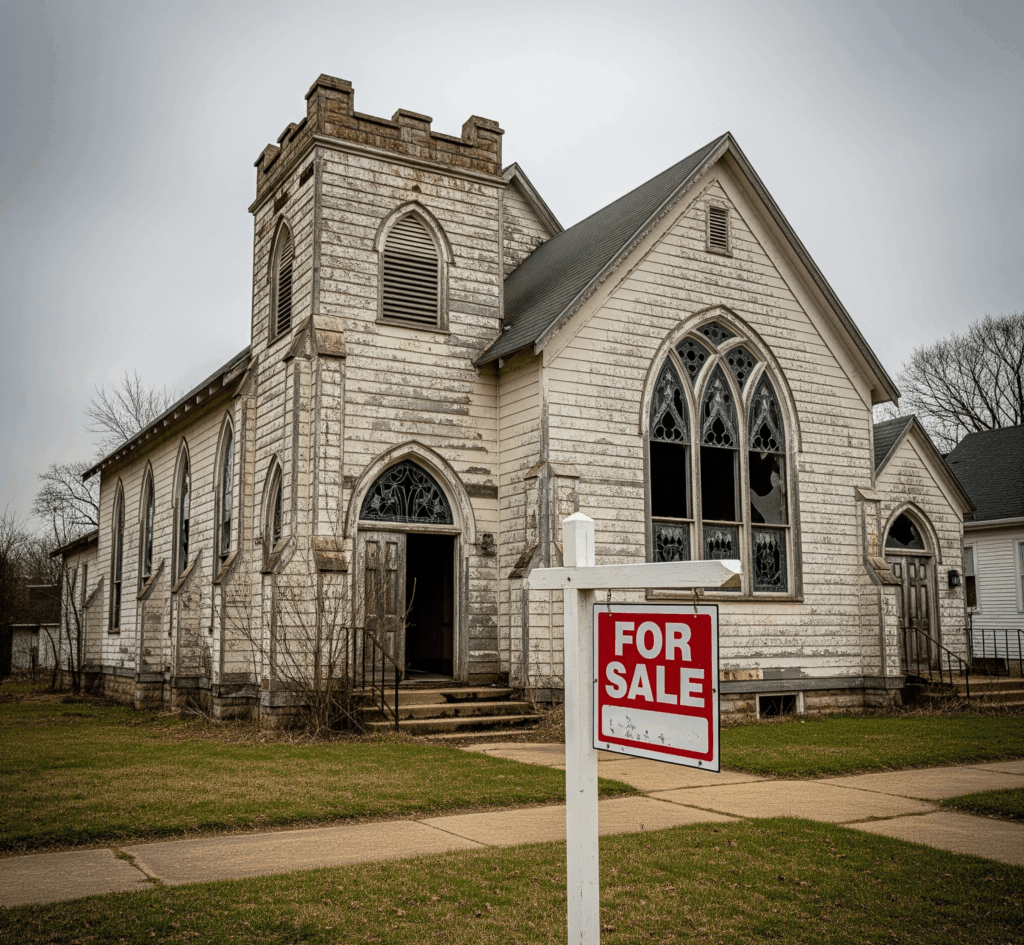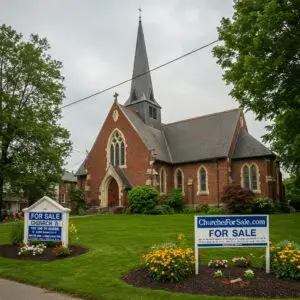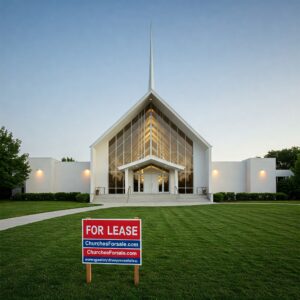
8 Common Pitfalls of a Church Real Estate Transaction
Real estate transactions involving church properties are not your ordinary deals. Churches often have deep historical, emotional, and spiritual value that influence the process significantly. When you see a church for sale, you’re not just looking at square footage—you’re dealing with legacy and mission.
Church real estate deals also involve unique sets of legal, financial, and operational considerations. These include zoning laws, nonprofit structures, internal governance, tax exemptions, and public perceptions. Many churches for sale bring layers of complexity that brokers and church leaders may not initially anticipate.
To ensure a transaction is smooth and beneficial to all parties involved, education becomes key. This article outlines common pitfalls that church leaders and real estate professionals should seek to avoid. By understanding what can go wrong, your church for sale experience can lead to a stronger, healthier future.
Pitfall #1: Inadequate Due Diligence
Due diligence is the most crucial first step in any transaction, especially with churches for sale. Failing to complete a deep dive into the property’s legal and operational status is a costly mistake. Churches often carry unique liabilities and histories that can impact a sale in unseen ways.
Title problems, unpaid liens, old deed restrictions, or past litigation issues can surface unexpectedly. Congregations might assume all records are current and in order, but this is often not the case. If legal issues aren’t discovered early, the entire sale process could fall apart later.
Doing your homework saves both time and money. Proper due diligence should include reviewing historical use, public records, permits, and legal restrictions. Once this is complete, attention must turn toward how the church property can legally be used going forward.
Pitfall #2: Overlooking Zoning and Land Use Restrictions
Zoning laws can cause major obstacles in transactions involving churches for sale. Just because a property has been used for worship doesn’t guarantee it still meets zoning requirements. In certain municipalities, old church buildings fall under zones that no longer allow religious gatherings.
Future use of the property is key—some buyers may intend to use it for community outreach or daycare programs. Without confirming the zoning classification, the intended use may not be legal under current municipal codes. This can lead to conflict with city agencies or even reversal of the sale.
Zoning research should include future adaptability of the building and its lot. Look for limitations on parking, occupancy, or expansion. Once these issues are resolved, evaluating the physical structure becomes the next necessary step in safeguarding the transaction.
Pitfall #3: Ignoring Building Condition and Deferred Maintenance
Buildings used for religious purposes often age differently from commercial or residential structures. When evaluating a church for sale, hidden maintenance issues or outdated systems can drive up post-sale costs. Patching over big problems leads to greater instability and financial burdens.
Common issues include outdated HVAC, leaky roofs, or neglected plumbing and electrical systems. Many churches defer maintenance for years due to budget constraints. Those same issues resurface when selling the property, handing the responsibility off to unaware buyers.
It’s essential to contract a qualified inspector familiar with institutional buildings like churches. Don’t rely solely on seller statements—get reports in writing and include repair costs in your projections. Once the building’s condition is understood, proper valuation becomes the next critical topic.
Pitfall #4: Incorrect Valuation of Church Property
Many churches for sale have pricing that does not reflect true market conditions. Emotional value or limited market data may skew expectations. This can drive negotiation challenges or deter serious buyers from investing time and energy.
Check out this other article titled: How do I know how much my church is worth?
Standard appraisals don’t always apply well to religious properties due to lack of comparable sales. Overpricing based on sentiment leads to longer listing periods and public confusion. Underpricing, meanwhile, risks undervaluing the congregation’s assets meant for future ministry goals.
Getting the valuation right may involve working with specialists in religious or nonprofit real estate. They understand functional use, land value, and replacement cost better than standard appraisers. Valuation errors highlight the need for accurate documentation, which is the next potential pitfall.
Pitfall #5: Incomplete or Inaccurate Documentation
Few things derail a church real estate transaction faster than missing or outdated documentation. A church for sale must be backed by clear records that show ownership, authority to sell, and compliance with legal requirements. Many churches operate for decades without updating these files.
Documents to review include deeds, nonprofit status verification, bylaws, meeting minutes, and property surveys. Missing items or inconsistencies in legal descriptions can delay or cancel a closing. Title companies will often refuse to proceed until clarity is achieved.
Taking time to gather and review necessary paperwork ensures a smoother transaction. This preventive step also helps resolve authority issues, which is another major area of vulnerability for church leaders.
Pitfall #6: Failing to Address Governance and Authority
Churches often have nontraditional legal structures, especially in denominational systems. Before finalizing anything on a church for sale, confirm who truly has authority to sign and approve decisions. Missteps here can invalidate contracts or cause long-lasting internal damage.
Some church boards assume authority rests locally, but denominational bylaws may require approvals from regional bodies. Others may forget to record authorization at meetings or fail to document proper voting procedures. These gaps can open the door to legal challenge.
Ensuring all governing bodies are notified and approve the transaction is critical. Legal counsel should be consulted to confirm proper procedures. With a clear line of authority in place, it’s now vital to examine possible tax implications.
Pitfall #7: Tax Exemption and Liability Pitfalls
Churches and tax exemptions are closely linked, but losing that status during a sale is a real risk. When a church for sale changes ownership, exemptions must be reviewed and sometimes re-applied for. Failing to do this can result in surprise tax bills or penalties.
Some parts of the property may already be taxable, such as rented offices or fellowship halls used commercially. Without careful review, buyers assume full exemption and face unexpected local or state taxes later. Each jurisdiction has its own filing requirements and deadlines.
One of the best resources that we have found in this area is Church Law & Tax.
Before listing or purchasing, work with a CPA familiar with nonprofit property taxation. Don’t make assumptions—get clear, documented confirmation of every tax obligation. After clearing up financial concerns, ensure you manage the entire transition process with care.
Pitfall #8: Poor Post-Sale Transition Planning
A successful transaction doesn’t end with handing off the keys. Without a thoughtful transition plan, confusion and disruption follow. Transition matters include utility transfers, ministry relocation, and community notification.
Neglecting these details can damage the legacy of the selling church and create friction with the community. For buyers, mismanaging setup can result in service interruptions and failed public outreach initiatives. A well-coordinated transition serves everyone involved with clarity and grace.
Church leaders should establish transition teams and timelines well before closing. Communicate clearly with the congregation, legal counsel, and the buyer. When transition matters are addressed, successful next steps are possible—for both departing churches and incoming ministries.
Additional: Case Study
*Church Name and location was changed for Confidentiality.
Background
Example Church “A”, a mid-sized congregation with a century-old building, decided to sell its property after merging with another local church. The church council wanted to support a seamless sale and preserve their legacy, turning over the space to a community nonprofit. They sought to avoid typical challenges associated with selling churches for sale.
The Situation
The church listed their building with a real estate broker experienced in church for sale listings. There was early interest from several buyers, including developers and ministries. The council selected a local nonprofit that planned to operate a community outreach center.
Several potential pitfalls emerged during the transaction:
Due diligence on title revealed an old easement for a utility line.
Zoning codes had changed, and the building’s usage permit was outdated.
Deferred maintenance issues surfaced during inspection—heating and electrical systems needed updates.
A previous sale 30 years ago included a deed restriction limiting usage to religious or educational purposes.
The church council’s meeting minutes and board approvals were outdated and incomplete.
There was confusion over whether the regional denominational office needed to authorize the sale.
The building’s partial use as a rental space to a third-party business raised tax and exemption concerns.
No utility transition plan was in place.
Solutions Implemented
To resolve these issues, the church and broker took the following steps:
Hired a real estate attorney to review the title and address the easement.
Consulted the city’s planning department to update zoning and secure the necessary permits for the buyer’s planned use.
Commissioned in-depth inspections and negotiated repair credits to account for deferred maintenance.
Sought clarification on historic deed restrictions and worked with all parties to draft new usage agreements.
Gathered all council meeting minutes and secured new, clearly documented board approvals.
Coordinated with the denominational office to obtain formal consent.
Worked with a nonprofit-specialist CPA to outline tax obligations and handle exemption transitions, especially for the rental areas.
Created a joint transition team between buyer and seller to manage utilities, public communication, and legacy asset transfers.
Outcome
The sale was completed without legal challenges or tax surprises. The nonprofit moved in on schedule and began community programs immediately. Example Church “A” ensured its legacy was honored, and relationships with neighbors and the local government remained positive.
Lessons Learned
Thorough due diligence prevents hidden problems from derailing a sale.
Clear, current documentation is vital for both legal and governance reasons.
Open communication with denominational bodies and city officials streamlines the process.
Early planning for tax and utility transitions prevents costly mistakes.
This case study highlights how churches for sale, when handled with attention to detail and proactive team support, can avoid common pitfalls and set up both seller and buyer for long-term success.
Conclusion
Navigating the landscape of churches for sale is no simple task. The unique nature of these properties and their spiritual purpose makes every transaction important. A single mistake—legal, financial, or structural—can stall or even ruin the deal.
Church leaders and real estate professionals must be proactive and informed. Each pitfall in this article represents a lesson learned by others. By avoiding these common traps, parties on both sides can serve the mission better and use resources wisely.
Approaching a church for sale with diligence, support, and a clear plan helps everyone win. With care, the property’s next chapter can honor its past and expand its impact. The results mean stronger communities and ministries that continue to thrive.







